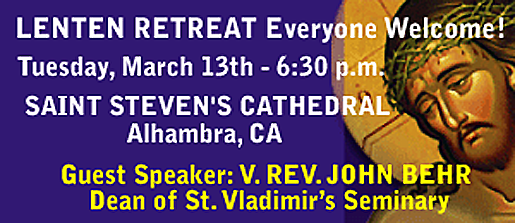Theology
The Meaning of Christ's Cross
23. March 2012 - 10:46The Mystery of Redemption
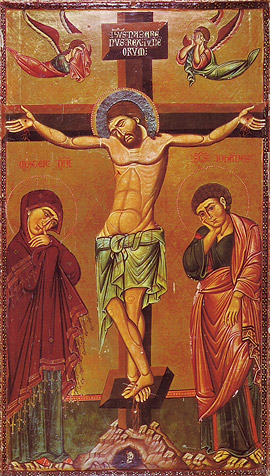 The Crucifixion. Sinai Monastery. 8th c.The following story may partially clarify the subject we want to discuss here. A wealthy man had two sons. The older one was gentle, industrious and obedient. The younger one, to the contrary, was lazy, thoughtless and willful. He loved to run away from home to meet with his vagrant friends. This greatly saddened his father.
The Crucifixion. Sinai Monastery. 8th c.The following story may partially clarify the subject we want to discuss here. A wealthy man had two sons. The older one was gentle, industrious and obedient. The younger one, to the contrary, was lazy, thoughtless and willful. He loved to run away from home to meet with his vagrant friends. This greatly saddened his father.
Once, when the father left for a few days, the younger son decided to throw a party for his friends. The music blared and the wine poured. The friends, being aroused by the wine, started to quarrel. There ensued a bad fight, culminating in severe injuries and a fire in the house. To avoid punishment, the younger son ran away. The father, upon returning home, became very upset with his younger son. The older son, feeling sorry for his brother, went to find him. After searching for several years, he finally found him, ill and exhausted in jail in some border town. The older son paid the judge the required fine and obtained his brother's release. Then he ministered to him, got him some decent clothes and took him back to his home estate. However, the younger son, realizing his guilt, was afraid even to appear before his father. To help him, the older brother went to the father, fell on his knees and tearfully began asking him to forgive the younger son. He guaranteed that the other had changed, and offered to make good all the losses his brother had caused. The father, touched by the love of the older son, forgave the younger one and accepted him unconditionally.
Patriarch Irinej on the significance of the Liturgy
14. March 2012 - 10:26 His Holiness Irinej, Serbian Patriarch served on the Second Sunday of the Lent the Liturgy of St. Basil the Great in the church of St. Basil of Ostrog on Banjica. He was concelebrated by the brotherhood of the church with the chanting of the choir. After the Holy Communion Patriarch held a sermon on the significance of the liturgical gathering, about the greatness of Christ's forgiveness, and about the a beneficial influence of the Lent on man's spirit.
His Holiness Irinej, Serbian Patriarch served on the Second Sunday of the Lent the Liturgy of St. Basil the Great in the church of St. Basil of Ostrog on Banjica. He was concelebrated by the brotherhood of the church with the chanting of the choir. After the Holy Communion Patriarch held a sermon on the significance of the liturgical gathering, about the greatness of Christ's forgiveness, and about the a beneficial influence of the Lent on man's spirit.
Wednesday in the Third Week of Great Lent.
14. March 2012 - 10:15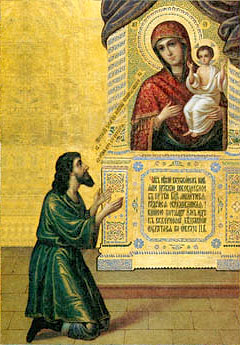 The time of Great Lent is becoming shorter for Christians day by day. Day follows day, bringing us ever closer to the festive weeks of Christ’s Resurrection. The joy of anticipation kindles our feelings, while at the same time, sadness engulfs our soul as the conscience informs the heart that we have not spent the time of the fast as befits a true Christian.
The time of Great Lent is becoming shorter for Christians day by day. Day follows day, bringing us ever closer to the festive weeks of Christ’s Resurrection. The joy of anticipation kindles our feelings, while at the same time, sadness engulfs our soul as the conscience informs the heart that we have not spent the time of the fast as befits a true Christian.
Nevertheless, the time has not yet emptied into eternity. The Gospels and the Church never silence their preaching of repentance, and they call us to it. Repent: for the kingdom of heaven is at hand (Mt. 4:17). With these words, Jesus Christ began to preach. It would follow that salvation of the soul and repentance are two truths that are unthinkable one without the other. Without repentance there is no salvation.
Second Sunday of Great Lent. St. Gregory Palamas. God is Light
12. March 2012 - 11:59Our Holy Father, St. Gregory Palamas
Commemorated November 14/27, and on the Second Sunday of Great Lent
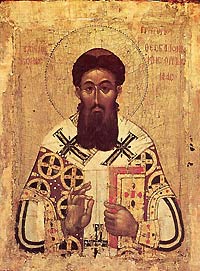 St. Gregory Palamas, one of the pillars of Orthodoxy, was born in 1296, probably to a noble Anatolian family in Constantinople. He and his brother went to Mount Athos in around 1318, and lived in Vatopedi and Esphigmenou Monasteries. Gregory also successfully persuaded his widowed mother, brothers and sisters to become take up the monastic life. With the encroachment of the Turks, he was forced to flee to Thessalonica, being ordained a priest there in 1326. Afterward, he took up the eremetic life at a mountain near Beroea, and eventually returned to Athos in 1331.
St. Gregory Palamas, one of the pillars of Orthodoxy, was born in 1296, probably to a noble Anatolian family in Constantinople. He and his brother went to Mount Athos in around 1318, and lived in Vatopedi and Esphigmenou Monasteries. Gregory also successfully persuaded his widowed mother, brothers and sisters to become take up the monastic life. With the encroachment of the Turks, he was forced to flee to Thessalonica, being ordained a priest there in 1326. Afterward, he took up the eremetic life at a mountain near Beroea, and eventually returned to Athos in 1331.
St. Gregory lived in very difficult times, for many heresies were creeping into the Church, and the Ottoman Empire was ever expanding, taking over Byzantine lands. In the early 1300’s he wrote on the nature of the Holy Spirit, showing the errors of the Latin view while living at the hermitage of Saint Savvas on Mount Athos. He became known as a preeminent theologian early in life, due to his many writings and for his beliefs on hesychasm.
When Should Children Begin to Fast?
12. March 2012 - 11:39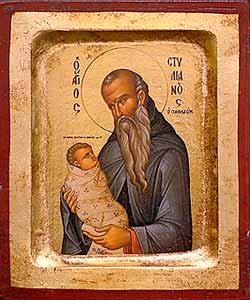 Take possession of your stomach, before it takes possession of you. —St. John Climacus
Take possession of your stomach, before it takes possession of you. —St. John Climacus
How early should children begin fasting? According to the teaching of the ancient fathers, a healthy child begins to fast once it no longer takes its mother’s milk, that is, at around age three. (In ancient times, Jewish women breastfed their infants until they reached three years of age).
Along with the need to observe whatever degree of fasting, parents must also take care to prevent their children from forming a habit of overeating, or eating too often, outside of the times established for taking food—eating between meals. St. Theophan the Recluse gives parents advice in this regard: “A child should eat in such a way that while developing and fortifying the body and giving it health, he does not foment flesh-pleasing in the soul. Regardless of how young your child is, he must begin from the earliest years to stabilize the flesh, which leans toward coarse matter, and accustom it to self control, so that in both the childhood and teenage years and beyond, he can easily and freely control this need.”

